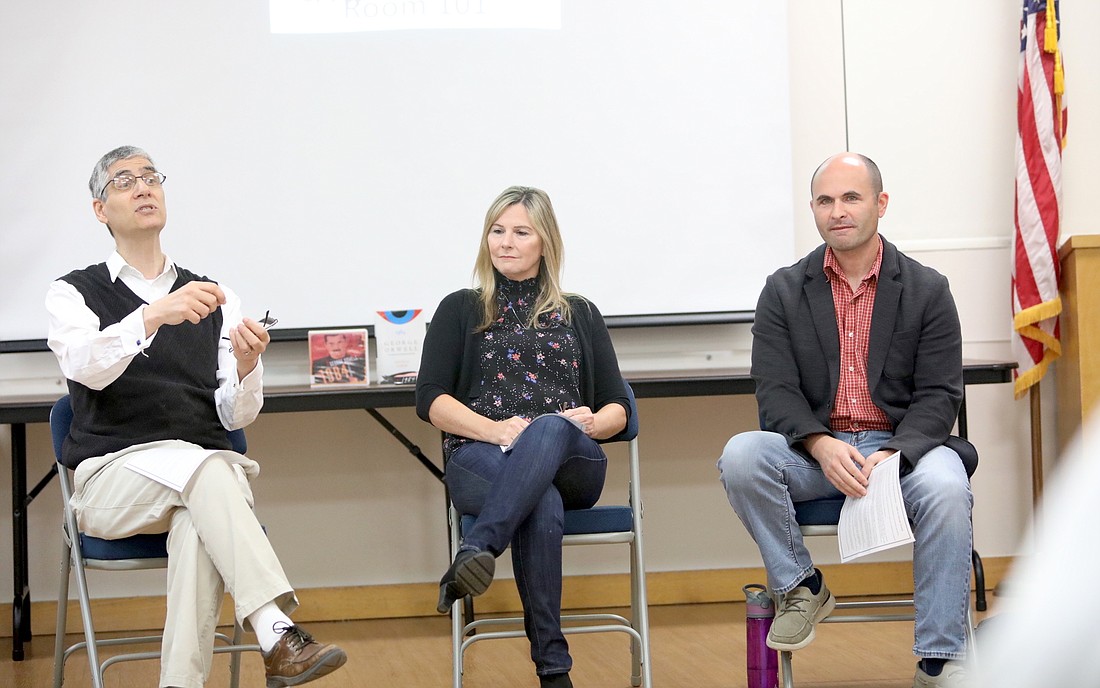- April 25, 2024
-
-
Loading

Loading

For those who have read George Orwell’s “1984,” it’s ironic that a book about thoughtcrime is constantly challenged or banned.
Flagler County Library Director Holly Albanese agrees, which is why she chose it for the library’s first “Banned Books” book discussion on Sept. 24 at the Palm Coast branch of the Flagler County Public Library.
“A lot of what you read in 1984 resonated with a lot of the things that we talk about today with banning books,” Albanese said.
Albanese had been approached by Brian McMillan, former executive editor of the Palm Coast Observer, to turn national banned book week, Sept. 18-24, into something similar to “Flagler Reads” in March — a series of events throughout the month instead of just the normal book displays.
So for the first four Fridays of September, Albanese themed the library’s weekly matinees to banned books, finishing with a movie showing of “1984.”
McMillan, Albanese and FlaglerLive Editor Pierre Tristam hosted the Sept. 24 book discussion. Albanese said about 21 people showed for the book club — the perfect amount for a good debate.
“It was a great discussion,” she said. “Both Brian and Pierre are huge bibliophiles, so I expected them to come with a fresh perspective, and things maybe I had not thought of, and certainly they did.”
The two led the discussion, with participation from the audience, touching on themes like apathy among the working class, how government shapes a narrative in “1984,” and parallels to today’s society.
Tristam pointed out that there’s a difference between banning a known book versus an unknown one. Popular, known titles that are challenged draw more publicity, he said.
“But removing a book from a shelf or preventing a book from getting to the shelf before we even know about it is what’s taking place now,” Tristam said to the group. “[It] is a lot more dangerous, because then the child will not have been exposed to something that could change their life.”
Fervor over banned books this year inspired Gemma Rose, a youth services librarian at the county library, to create a longer running banned book club called Freedom Readers.
“We don’t act in loco parentis. The parents are responsible to choose or select whatever they want their children to read or not read.”
HOLLY ALBANESE
With signed permission slips, 15-18 year olds have a space to discuss their ideas and opinions on challenged books. Rose said in an email that the club had an overwhelmingly positive response for its first meeting on Sept. 20.
Flagler County saw its own challenge to books when School Board member Jill Woolbright filed a criminal complaint last spring about the presence of “All Boys Aren’t Blue,” by LGBT activist George M. Johnson, in school libraries. That led the district to create a three-tiered opt-in program for public school media centers, giving parents more control over their child’s access without censoring material for other children.
Albanese said she paid attention to the dialogue happening across the community and nation about book banning, and she said she took steps in response to it. She reviewed procedures for complaint on materials and created one for displays and programs. Albanese said in her 17 years at the library, they have never removed a book because of a complaint.
“We don’t believe in censoring material at all,” she said.
As far as what is or is not appropriate for children, Albanese said, library staff won’t make decisions for parents: That is the parents’ job, and she encourages parents to join their kids in the library.
“We don’t act in loco parentis,” Albanese said. “The parents are responsible to choose or select whatever they want their children to read or not read.”
Associate Editor Brent Woronoff contributed to the story